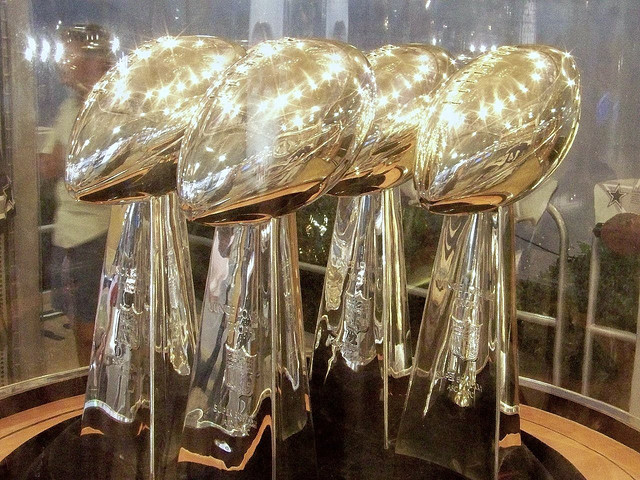"Football Freakonomics": Incentives
The following is a cross-post from NFL.com, where we’ve recently launched a Football Freakonomics Project.
Today’s question on “Football Freakonomics” is a tricky one. Which incentive is stronger for an NFL player: landing a big contract or winning the Super Bowl?
It can be devilishly hard to find out what truly motivates people to do what they do. There are a lot of reasons for this. Different people have different preferences; an incentive that works for a while may wear off over time; and it’s dangerous to rely on what people say about their motivation, since most of us are concerned about saying “the right thing.”
It’s better, therefore, to measure actual behavior – in this case, for instance, how players perform before and after signing a big contract.
That’s what Brian Burke of Advanced NFL Stats did for us, analyzing all multi-million-dollar contracts for NFL running backs since the 2000 season, a sample of 28 contracts. He found that in the year after signing their big deals, these running backs averaged .3 yards less per carry. That’s a pretty startling drop. It could be interpreted in at least two ways:
- Once he got his money locked up, the running back had a weaker incentive to perform well.
- The reason the running back got his new monster contract in the first place is that he was performing out of his mind – and was bound, therefore, to fall back to earth a bit. So the team made the same mistake that a lot of stock-market investors make: they bought high.
And let’s not forget that the running back is now a year older, and running backs tend to not age gracefully.
Burke also looked at the performance of running backs, quarterbacks, and wide receivers on Super Bowl-winning teams. Once again, he saw a drop-off from the Super Bowl season to the following season: .41 yards per attempt for quarterbacks; .43 yards per target for receivers; and more than half a yard per carry for running backs.
Again, you could interpret these data to mean at least two things:
- Winning the ring was the main incentive and once that was accomplished, the player’s motivation fell.
- It’s hardly surprising to see such a steep fall because these players obviously had an aberrationally good season in order to win the Super Bowl in the first place.
Truth be told, asking whether money or winning is a bigger motivation is almost a trick question, like asking what’s the better food – pizza or hamburgers. They’re both great! Getting paid and getting a ring are both profoundly strong incentives.
It will, however, be interesting to watch how players are incentivized by big money now that big money is getting harder to come by. As the “Tilting the Wage Scale” section in the accompanying graphic makes clear, guaranteed contracts are shrinking mightily. The top three picks in the 2010 draft (Sam Bradford, Ndamukong Suh, and Gerald McCoy) each received an average of $41.7 million in guaranteed money. Then came the lockout, and a new deal between the owners and players. In 2011, the top three picks (Cam Newton, Von Miller, and Marcell Dareus) each received an average of just $21.1 million (or should I say “just”) in guaranteed money.
So we’re at the beginning of a new era for cash incentives in the NFL. Which, theoretically, makes winning a Super Bowl even more valuable. Will we therefore witness a sea change in players’ motivations?
Probably not. The fact is that we all constantly responding to private incentives and collective incentives. A football player wants to do well for himself and he wants his team to win. But private and collective incentives don’t always align. Consider the phenomenon of penalty kicks in soccer. Statistically, a kicker is most likely to succeed by kicking the ball down the center of the goal, since the keeper almost always jumps either left or right. So if a kicker truly wants his team to win, he’ll be more likely to choose the center. But that rarely happens. Why? Because if a kicker goes right or left and the keeper makes a great save, he can attribute his failure to the keeper’s great play. If he goes down the center and fails – well, he’ll be considered a fool for the rest of his days for even thinking about kicking the ball down the middle. So while we might think that he’s got the team’s incentive at the front of his mind, his private incentive – to not go down in history as a fool — is probably just a little bit stronger.


Comments